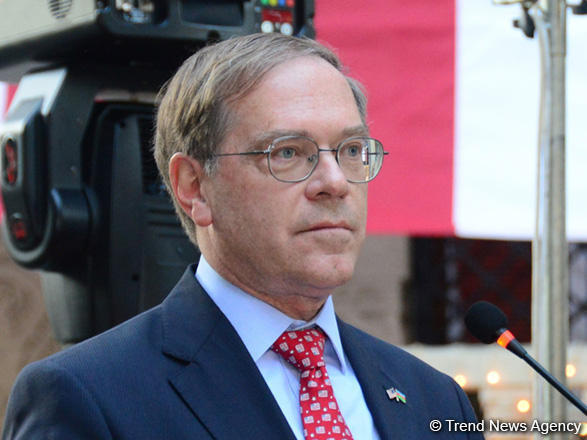U.S. envoy cites three principles for solving Karabakh conflict

By Abdul Kerimkhanov
The resolution of the Armenian-Azerbaijani Nagorno-Karabakh conflict must be based on the three principles of the Helsinki Final Act, the U.S. ambassador to Azerbaijan Lee Litzenberger said during a live chat on Facebook on November 19.
"Our efforts are based on the principles of the Helsinki Final Act, which lays out that the process should be founded on three principles. A negotiated settlement should be based on the first principle of the non-use or threat of use of force. Second, it should respect the principle of territorial integrity and third, it should respect the principle of the right of people to self-determination," he stated.
Litzenberger recalled that Washington is committed to helping reach a negotiated peaceful settlement to the Nagorno-Karabakh conflict.
"I can assure you the U.S. is deeply concerned about the Nagorno-Karabakh conflict. This is an issue that features in almost every single meeting I have in this country. As one of the co-chairs of the Minsk Group process, we are committed to helping reach a negotiated peaceful settlement," he said.
He emphasized the U.S. side wants to encourage both parties to the conflict to work together to find the solution to issue.
As Litzenberger stressed, Washington prefers providing assistance both to Azerbaijan and to Armenia rather than sanctioning either country, adding that the U.S. provided a substantial amount of assistance to Azerbaijan.
"For example, since 1992, we have provided over $1.5 billion in US assistance to all areas of Azerbaijan’s society and economy. This includes assistance in the areas of healthcare, education, security assistance and exchanges, economic development. We are committed to helping Azerbaijan address the consequences of conflict, and to help Azerbaijan work towards a solution to the conflict," Litzenberger concluded.
Azerbaijan and Armenia are locked in a conflict over Azerbaijan’s Nagorno-Karabakh region that along with seven adjacent districts came under occupation of Armenian forces during the war in early 1990s. The occupation displaced around one million Azerbaijanis that were expelled from their homes.
OSCE Minsk Group co-chaired by representatives from Russia, U.S. and France has been brokering the peace negotiations since 1994 and so far the negotiation process has not yielded any results.
Today, the U.S. provides humanitarian assistance to the victims of the conflict, which includes support for housing and school repairs, primary health care, irrigation, potable water and sanitation, subsistence agriculture, micro-finance, and demining.
It should be noted that in 1992, the US passed an Armenian-initiated Section 907 of the Freedom Support Act that bans any kind of direct U.S. aid to the Azerbaijani government after Baku blockaded Armenian following the occupation of its territories. Thus, all 15 republics were eligible for assistance, with the exception of Azerbaijan.
---
Abdul Kerimkhanov is AzerNews’ staff journalist, follow him on Twitter: @AbdulKerim94
Follow us on Twitter @AzerNewsAz
Here we are to serve you with news right now. It does not cost much, but worth your attention.
Choose to support open, independent, quality journalism and subscribe on a monthly basis.
By subscribing to our online newspaper, you can have full digital access to all news, analysis, and much more.
You can also follow AzerNEWS on Twitter @AzerNewsAz or Facebook @AzerNewsNewspaper
Thank you!
